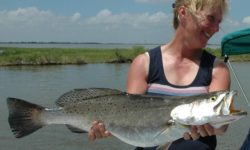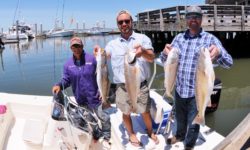By Terry Lacoss
Ultra clean waters produced by the current full moon and super high tides have put the local stock of sea trout on a big feed. During this past weekend conditions were ideal for targeting spotted sea trout during the early morning flood tide where good numbers of trout were splashing and thrashing on surface plugs, sub surface lures and plastic D.O.A. shrimp fished under a popping cork. Locating good numbers of schooling finger mullet holding close to flooded oysterbars is key when locating schooling sea trout.
Some of the best flood tide sea trout action in recent days has been coming where water clarity is clean including Soap, Kingsley, Alligator and Lanceford Creeks. Also include Tiger Beach which includes the southern shoreline of Cumberland Sound.
The cooler months of fall, winter are by far the best time of year for taking trophy sea trout while fishing the fertile fishing waters of Amelia Island where multiple strikes offer exciting inshore fishing action.
One of the all-time favorite sea trout waters includes the mouth of Egan’s Creek where a deep shoreline harbors broken dock pilings and deeper water submerged rocks. Working a slow sinking minnow type plug here is key. including the Rapala “Count Down”. Be sure and bring along a lure retriever as the rocky bottom harbors plenty of snags that will steal your expensive trout plug. At Nassau Sound, the mouth of Simpson and Sawpit Creeks offer excellent trophy sea trout fishing during the high incoming and falling tides as well.
For terminal fishing gear I would recommend a seven-foot medium action spinning rod with your spinning reel filled with 10-pound braided fishing line. A three-foot section of fluorocarbon shock leader is attached to the tag end of the braded fishing line using back to back “Uni” knots. Unless your sea trout plug has a split ring, use a “Loop Knot” when attaching your shock leader to your speck plug for better action.
The spinning reel drag should be set very light as large sea trout have very soft mouths, which tend to rip even the best saltwater hook free during their head shaking fight.
Large sea trout should be handled with care and released to guarantee several more fishing seasons of exciting sea trout action.
Spotted sea trout can live up to 15 years old, but most spotted trout don’t live more than 5- years. Along Florida's East Coast, large sow females weighing more than five pounds are frequently referred to as “Gator Trout”.
Saltwater angler Craig F. Carson landed the current IGFA world record spotted sea trout while fishing at the Fort Pierce inlet with live mullet on May 11, 1995 weighing 17Lbs. 7 oz.
The current Florida sea trout regulations allow fishermen to keep five sea trout per day measuring at least 15-inches with one sea trout in your bag limit measuring over 22-inches. Sea trout offer excellent table fare when cut up into small chunks, dipped into a milk and mayonnaise batter, then dipped into “Golden Dip”. Fry in vegetable oil until the chunks float to the surface and enjoy!
Florida’s “Youth” deer hunting season opens October 26-27 where youths 15-years old and younger can harvest one deer except spotted fawn. The youth hunter must be supervised by an adult, 18 years or older.
Florida’s zone-C deer hunting season opens on November 2nd through January 19th.










